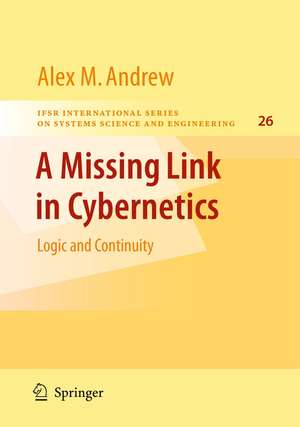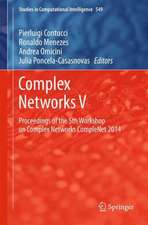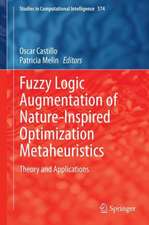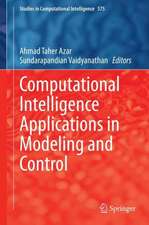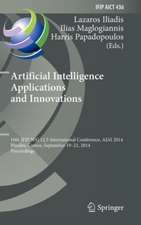A Missing Link in Cybernetics: Logic and Continuity: IFSR International Series in Systems Science and Systems Engineering, cartea 26
Autor Alex M. Andrewen Limba Engleză Hardback – 4 mar 2009
| Toate formatele și edițiile | Preț | Express |
|---|---|---|
| Paperback (1) | 633.68 lei 43-57 zile | |
| Springer – 6 dec 2010 | 633.68 lei 43-57 zile | |
| Hardback (1) | 639.72 lei 43-57 zile | |
| Springer – 4 mar 2009 | 639.72 lei 43-57 zile |
Din seria IFSR International Series in Systems Science and Systems Engineering
- 18%
 Preț: 948.65 lei
Preț: 948.65 lei - 18%
 Preț: 944.90 lei
Preț: 944.90 lei - 18%
 Preț: 1380.94 lei
Preț: 1380.94 lei - 18%
 Preț: 948.52 lei
Preț: 948.52 lei -
 Preț: 384.73 lei
Preț: 384.73 lei - 20%
 Preț: 987.40 lei
Preț: 987.40 lei - 18%
 Preț: 1123.97 lei
Preț: 1123.97 lei - 15%
 Preț: 632.91 lei
Preț: 632.91 lei - 15%
 Preț: 635.52 lei
Preț: 635.52 lei - 20%
 Preț: 982.49 lei
Preț: 982.49 lei - 18%
 Preț: 940.67 lei
Preț: 940.67 lei - 18%
 Preț: 946.01 lei
Preț: 946.01 lei - 15%
 Preț: 639.11 lei
Preț: 639.11 lei -
 Preț: 383.78 lei
Preț: 383.78 lei - 18%
 Preț: 1101.73 lei
Preț: 1101.73 lei - 20%
 Preț: 501.42 lei
Preț: 501.42 lei - 18%
 Preț: 1108.01 lei
Preț: 1108.01 lei -
 Preț: 396.36 lei
Preț: 396.36 lei -
 Preț: 388.52 lei
Preț: 388.52 lei - 15%
 Preț: 641.85 lei
Preț: 641.85 lei - 19%
 Preț: 447.26 lei
Preț: 447.26 lei -
 Preț: 385.65 lei
Preț: 385.65 lei - 18%
 Preț: 786.19 lei
Preț: 786.19 lei - 15%
 Preț: 643.65 lei
Preț: 643.65 lei - 18%
 Preț: 780.56 lei
Preț: 780.56 lei -
 Preț: 516.26 lei
Preț: 516.26 lei - 15%
 Preț: 638.28 lei
Preț: 638.28 lei
Preț: 639.72 lei
Preț vechi: 799.66 lei
-20% Nou
Puncte Express: 960
Preț estimativ în valută:
122.52€ • 126.23$ • 102.63£
122.52€ • 126.23$ • 102.63£
Carte tipărită la comandă
Livrare economică 24 februarie-10 martie
Preluare comenzi: 021 569.72.76
Specificații
ISBN-13: 9780387751634
ISBN-10: 0387751637
Pagini: 139
Ilustrații: XI, 139 p. 4 illus.
Dimensiuni: 155 x 235 x 10 mm
Greutate: 0.39 kg
Ediția:2009
Editura: Springer
Colecția Springer
Seria IFSR International Series in Systems Science and Systems Engineering
Locul publicării:New York, NY, United States
ISBN-10: 0387751637
Pagini: 139
Ilustrații: XI, 139 p. 4 illus.
Dimensiuni: 155 x 235 x 10 mm
Greutate: 0.39 kg
Ediția:2009
Editura: Springer
Colecția Springer
Seria IFSR International Series in Systems Science and Systems Engineering
Locul publicării:New York, NY, United States
Public țintă
ResearchCuprins
Cybernetics: Origins and Aims.- Where to Start?.- Continuous versus Discrete.- Adaptation, Self-Organisation, Learning.- Backpropagation.- Self-Reference.- Fractal Intelligence.- Conclusions.
Recenzii
From the reviews:
"The work is a brilliant survey of the different theories concerning cognition, including viewing it as a fractal phenomena … . Andrew’s greatest achievement is precisely summarizing all these mathematical works into a single book, from which readers may choose the line of research that seems more appealing to them. … I recommend this book mostly to researchers, for the utility they could grasp from it. Any student of AI who has some advanced statistical mathematics background can also benefit from this work … ." (Arturo Ortiz-Tapia, ACM Computing Reviews, November, 2009)
“This new book by Alex M. Andrew has been published by Springer in the IFSR International Series on Systems Science and Engineering … . It deals with the frequently made discrepancy between the continuous and the discrete. … This book is highly recommended to researchers in artificial intelligence, cybernetics and systems science.” (Robert Vallee, Kybernetes, Vol. 39 (1), 2010)
“The book begins with an interesting perspective of the origins of cybernetics … . Each chapter has a useful summary at the end. I thoroughly enjoyed reading this book. It is very well researched, with numerous references to the literature, and to some important debates, over the last 70 years. … the book is descriptive and readily understandable. I happily recommend the book to relevant researchers in cybernetics, AI, and related fields.” (Richard Mitchell, Kybernetes, Vol. 39 (2), 2010)
"The work is a brilliant survey of the different theories concerning cognition, including viewing it as a fractal phenomena … . Andrew’s greatest achievement is precisely summarizing all these mathematical works into a single book, from which readers may choose the line of research that seems more appealing to them. … I recommend this book mostly to researchers, for the utility they could grasp from it. Any student of AI who has some advanced statistical mathematics background can also benefit from this work … ." (Arturo Ortiz-Tapia, ACM Computing Reviews, November, 2009)
“This new book by Alex M. Andrew has been published by Springer in the IFSR International Series on Systems Science and Engineering … . It deals with the frequently made discrepancy between the continuous and the discrete. … This book is highly recommended to researchers in artificial intelligence, cybernetics and systems science.” (Robert Vallee, Kybernetes, Vol. 39 (1), 2010)
“The book begins with an interesting perspective of the origins of cybernetics … . Each chapter has a useful summary at the end. I thoroughly enjoyed reading this book. It is very well researched, with numerous references to the literature, and to some important debates, over the last 70 years. … the book is descriptive and readily understandable. I happily recommend the book to relevant researchers in cybernetics, AI, and related fields.” (Richard Mitchell, Kybernetes, Vol. 39 (2), 2010)
Textul de pe ultima copertă
The relative failure of attempts to analyze and model intelligence can be attributed in part to the customary assumption that the processing of continuous variables and the manipulation of discrete concepts should be treated separately. In this book, the author considers concept-based thought as having evolved from processing of continuous variables. Although "fuzzy" theory acknowledges the need to combine conceptual and continuous processing, its assumption of the primacy of concept-based processing makes it evolutionarily implausible.
The text begins by reviewing the origins and aims of cybernetics with particular reference to Warren McCulloch’s declared lifetime quest of "understanding man’s understanding". It is shown that continuous systems can undergo complex self-organization, but a need for classification of situations becomes apparent and can be seen as the evolutionary beginning of concept-based processing. Possibilities for complex self-organization are emphasized by discussion of a general principle that has been termed significance feedback, of which backpropagation of errors in neural nets is a special case.
It is also noted that continuous measures come to be associated with processing that is essentially concept-based, as acknowledged in Marvin Minsky’s reference to heuristic connection between problems, and the associated basic learning heuristic of Minsky and Selfridge. This reappearance of continuity, along with observations on the multi-layer structure of intelligent systems, supports a potentially valuable view of intelligence as having a fractal nature. This is such that structures at a complex level, interpreted in terms of these emergent measures, reflect others at a simpler level. Implications for neuroscience and Artificial Intelligence are also examined.
The book presents unconventional and challenging viewpoints that will be of interest to researchers in AI, psychology, cybernetics andsystems science, and should help promote further research.
The text begins by reviewing the origins and aims of cybernetics with particular reference to Warren McCulloch’s declared lifetime quest of "understanding man’s understanding". It is shown that continuous systems can undergo complex self-organization, but a need for classification of situations becomes apparent and can be seen as the evolutionary beginning of concept-based processing. Possibilities for complex self-organization are emphasized by discussion of a general principle that has been termed significance feedback, of which backpropagation of errors in neural nets is a special case.
It is also noted that continuous measures come to be associated with processing that is essentially concept-based, as acknowledged in Marvin Minsky’s reference to heuristic connection between problems, and the associated basic learning heuristic of Minsky and Selfridge. This reappearance of continuity, along with observations on the multi-layer structure of intelligent systems, supports a potentially valuable view of intelligence as having a fractal nature. This is such that structures at a complex level, interpreted in terms of these emergent measures, reflect others at a simpler level. Implications for neuroscience and Artificial Intelligence are also examined.
The book presents unconventional and challenging viewpoints that will be of interest to researchers in AI, psychology, cybernetics andsystems science, and should help promote further research.
Caracteristici
Advances an alternative approach to analyze and model intelligence Presents thoughts and ideas systematically Includes supplementary material: sn.pub/extras
